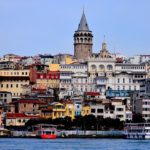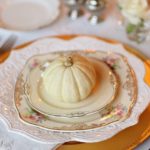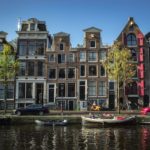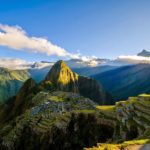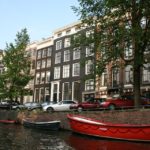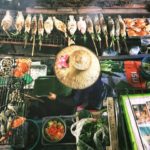How Living in Turkey Caused My Heart to Pound
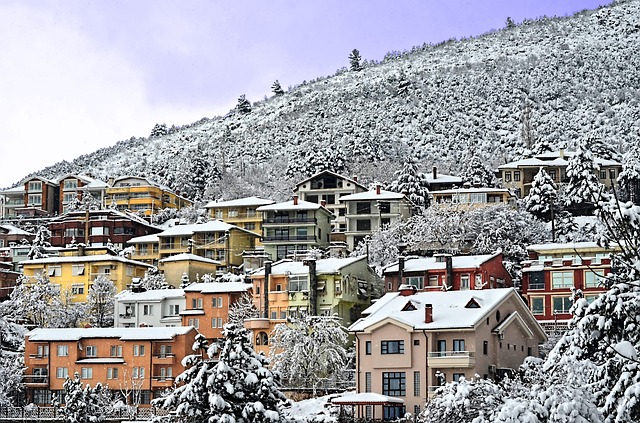
Two cars raced at high speed down crowded narrow streets, barreling into market stalls. Soon, police motorcycles pursued them, and as one of the cars flipped over, gunshots erupted from a man in each car. The police motorcycles crashed nearby, the occupants of the car commandeered them and somehow managed to navigate onto rooftops, heading crazily towards the Blue Mosque in the distance. My heart leapt into my throat.
I grabbed my friend’s arm and whispered in his ear, “I’m going to be there in a few weeks; I’m going to be living in Turkey!” as the opening sequence of James Bond’s Skyfall, shot in Istanbul, dizzied me with thrills and spills.
When Skyfall opened in November 2012, I had just accepted my first job teaching English in Turkey. The action in the opening sequence certainly had my heart pounding, but the sudden awareness as I viewed the exotic Grand Bazaar and Blue Mosque that I would soon be living in Turkey affected me even more.
Now, I knew this was just a Hollywood movie and generally James Bond doesn’t chase bad guys in everyday happenings, but as with any new awaiting adventure, I felt some trepidation about what I was getting myself into. Would I be able to find my way around in a country where I didn’t speak the language? Would I be able to shop for food and other essentials without knowing the right words? And, most importantly, would I be safe in a country that I knew very little about and that has a very different culture from my own?
The serene spinning of the Whirling Dervishes, with one arm reaching towards heaven and the other connecting downward towards the earth, piqued my interest in the people who lived this type of life.
Many friends and family members voiced their concerns over my living in Turkey, in this foreign place. I’d traveled all around the world alone, but being a tourist and living in a place for an extended period are different experiences. My desire to be in Turkey was inspired by a segment on the PBS channel showing the Whirling Dervishes.
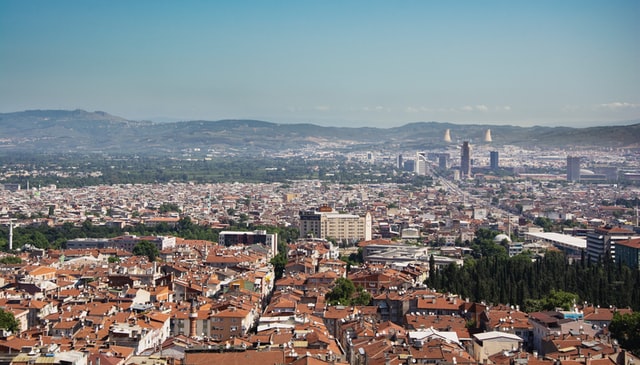
Their serene spinning, with one arm reaching towards heaven and the other connecting downward towards the earth, piqued my interest in the people who lived this type of life. Even though the Whirling Dervish ritual isn’t followed by all Turkish people, I felt fairly confident that the their attitude was something that was common.
And I was right. Turkey is a fascinating country, rich in history and traditions, along with people who are warm, generous and caring. It never ceased to surprise me how members of the community worked together and helped each other and strangers.
And I was right. Turkey is a fascinating country, rich in history and traditions, along with people who are warm.
My job was in one of the largest cities in Turkey: Bursa. Bursa is across the Marmara Sea from Istanbul, and has a huge Fiat manufacturing industry. I lived in an apartment in an older neighborhood.
One custom I enjoyed watching involved elderly women who lived on the fourth or fifth story of an apartment building putting money in a basket, catching the attention of a passerby, shouting their request down to that person, lowering the basket by rope to the street, then watching as the passerby actually came back with a loaf of bread or a head of lettuce, placing it and their change back into the basket for the woman to pull back up.
To see this happening in this day and age gave me even more reason to trust the Turkish people.
I felt safer walking at night in Turkey than I did in San Francisco, where I came from.
Never did I feel threatened or in danger in Bursa or anywhere I traveled to while living in Turkey. Of course, women need to follow common sense and the usual rules of safety. Don’t call attention to yourself. Be respectful of religious observations, meaning covering your head with a scarf in mosques. Dress inconspicuously, including not wearing spaghetti strap tops, shorts or low-cut tops. I felt safer walking at night in Turkey than I did in San Francisco, where I came from.
Since Turkey is steeped in history, I took many opportunities to visit historical sites. Many were Roman/Greek ruins and some were Biblical sites. Buses are the main form of long-distance travel in Turkey. These buses are almost like being on an airplane. There are hosts and hostesses who come down the aisle providing passengers with snacks and drinks. Each seat has its own screen to watch movies, play games or listen to music.
They are comfortable, clean and safe. The only downside is that they don’t have toilets built in, and sometimes the pit stops are few and far between.
For my first weekend trip, a coworker and I hopped on one of the buses and ventured to Kutahya. Kutahya is an ancient city, inhabited in the past by Romans, Seljuk Turks and Crusaders, among others. The ruins of the citadel vary in age and style. In the stone wall of one house, we discovered a bone as part of the reinforcement.
We hoped that it was an animal bone rather than that of a fallen soldier!
We hoped that it was an animal bone rather than that of a fallen soldier! Also noteworthy about Kutahya is that it was a refuge for Lajos Kossuth, a leader of the Hungarian revolution of 1848. The house where he lived in exile after the failure of the revolution is a comfortable home with large, open porches overlooking a big garden and nearby hills.
From Kutahya we took another bus out to a village called Cavdarhisar. The Roman/Greek ruins of Aizanoi are spectacular and very well hidden. It’s nowhere nearly as popular as the ruins in Ephesus. We were virtually alone in some areas of the ruins, with columns from the main government building and dungeon to the unique combined theatre-stadium where theatrical performances, along with gladiator fights, took place. There were no barriers on these ancient stones and we were free to climb all over them and explore the different areas of this structure.
Again, we were totally safe, even though we were in the middle of nowhere. Nobody bothered us or questioned what we were doing. When we made it to a small restaurant in the cold and pouring rain, the owner made sure we got hot soup and tea to warm us up while waiting for the return bus.
How Living in Turkey Caused My Heart to Pound.
Another more touristy city I explored alone was Pammukale, which means “cotton castle” in Turkish. The name is for the white terraces along a hillside that consist of travertine, which is a carbonate mineral hardened by flowing water, similar to what happens in caves providing a “cottony” appearance.
I thought this national park was particularly fun because to walk through it, you must take off your shoes to minimize damage to the deposits. The shimmering pools along the terrace were inviting. Many people were lounging in those pools.
I, however, waited to get into a pool when I reached the Roman ruins of Hierapolis at the top. This ancient thermal pool is filled with legendary curative water. Along the bottom of the clear pool rested remains of columns and building blocks of the city. I felt as though I were swimming on some kind of movie set where a story of Cleopatra rendezvousing with Ceasar in a luxurious Roman palace was being filmed. And, the bad cold I was nursing vanished after I bathed in these healing thermal springs!
I felt as though I were swimming on some kind of movie set where a story of Cleopatra rendezvousing with Ceasar in a luxurious Roman palace was being filmed.
Turkey is a surprising and inspirational country. There is so much to see and do that it would take years to explore it in detail. I felt so strongly about the place and its safety that I even invited a cousin, an aunt and my mother to visit me. My mother appearing half way around the world blew my mind! If somebody had told her, as a 10 year old girl growing up in Kansas, “When you’re in your 70s, you will travel to Turkey to visit your daughter!” she would’ve just laughed and said that was impossible.
Yet it wasn’t. The only caution I gave them, along with anybody walking across streets in Turkey, is: Beware! Pedestrians do NOT have the right of way. Even with “walk” lights. Crazy drivers are everywhere in the world, but it’s worth remembering not to get so distracted by the beautiful mosque in the distance that you have a run-in with a speeding car.
My love of Turkey is shared by my mother, aunt and cousin. We often reminisce about what we saw and did there. How we felt welcomed by the Turkish people. How we could walk around at night without worry. And how it’s a one-of-a-kind country filled with stories and beauty. No, I didn’t witness James Bond pursuing a villainous thug through the Grand Bazaar or across rooftops, but I did away with any misgivings I started out with and replaced them with joy, wonder and fulfillment.
How Living in Turkey Caused My Heart to Pound
Have you traveled to Turkey? How was your trip? Email us at [email protected] for information about sharing your experience and advice with the Pink Pangea community. We can’t wait to hear from you
How Living in Turkey Caused My Heart to Pound photo credits: Pixabay and Unsplash.

